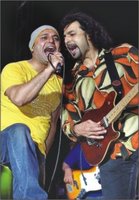
By Cultural Correspondent - The Daily Star - Dhaka,Bangladesh
Wednesday, October 4, 2006
The genesis of Pakistani band 'Junoon' (obsession or passion in Urdu) is interesting. Apparently the name came to lead guitarist and vocalist Salman Ahmad in a dream when he 'saw' one of his teachers shaking him and saying, "Tumhey mousiqui junoon hai!" (meaning "You have an obsession for music!").
Currently comprising, Ahmad and Ali Azmat (lead and vocalist), enthusiastic audiences eagerly await every new release. Both members have released their debut solo album in the market. According to Azmat and his team, they are back in the studio for his second solo album, which will be launched in 2007. Ahmad on the other hand claims that Junoon will release their eighth studio album in the year 2007.
The popular band was formed in 1990 by Ahmad and included Azmat on vocals and Nusrat Hussain on keyboards. The group was later complemented by Brian O'Conell (bass guiter), while band manager Shehryar Ahmad provided the backing.
Though the band's first album, the self-titled Junoon, failed to create a stir in the Pakistani music industry, their second album Talaash began creating a cult following for Junoon. However, it was only after their 1995 release of their third album, Inquilaab (Revolution) that Junoon's popularity reached a zenith.
According to Ahmad: "Our music blends rock with Sufi (a mystical strain of Islam) sentiments. The poetry and songs of Bulle Shah and Baba Farid, both renowned Sufi saints, have attracted me. I have also been inspired by other Sufi masters who believed that it is only through love that one comes closer to each other and God." Junoon's tunes blend rock guitars, bluesy vocals with eastern inputs such as tablas, raga-inspired melodies, traditional Paksitani folk music and Sufi poetry.
A landmark is Junoon's career is the immensely popular hit single Sayonee (1998), a part of their successful fourth studio album Azadi (Freedom). A year later Junoon released their fifth studio album, named Parvaaz (The Flight), based largely on the poetry of Baba Bulleh Shah. The album was recorded and mixed at Abbey Road Studios in London and hailed by the critics as the group's best work to date. Another laurel was the award of Best International Group at the Channel [V] Music Awards in New Delhi in November 1999 where Sting, Def Leppard and Prodigy performed along with Junoon.
Among other achievements of the group: a UNESCO invitation to perform at the Millennium Peace Concert in 1999 in Paris; the release of Ishq (2001) and Deewar (2003); the appointment of Ahmad as Goodwill Ambassador by the United Nations. Likewise, following the 9/11 attacks, Junoon helped to organise a concert at the General Assembly on UN Day with Junoon and an Indian group performing at the Assembly Hall, a first of its kind. They also released what they called their first English language single, No more -- a tribute to 9/11 victims.
The last few years have been productive for Junoon. In 2003 their song Garaj Baras was selected as part of the soundtrack for the Pooja Bhatt film Paap, which topped the charts in 2004. Pappu yaar tang na kar, a single by the band, again leapfrogged to the no 1 spot in Pakistan.
In 2005, bass guitarist of the band Brian O'Connell returned to his native New York. Pakistani musician Mekal Hazzan and the band's producer John Alec have been playing bass guitar for live shows in his place. A reunion took place in Dubai, UAE in March 2006.
Junoon is still that same sensational entity that it was when it released Inquilab and Aazadi. Fans await great music and lots of it in their next album.








No comments:
Post a Comment